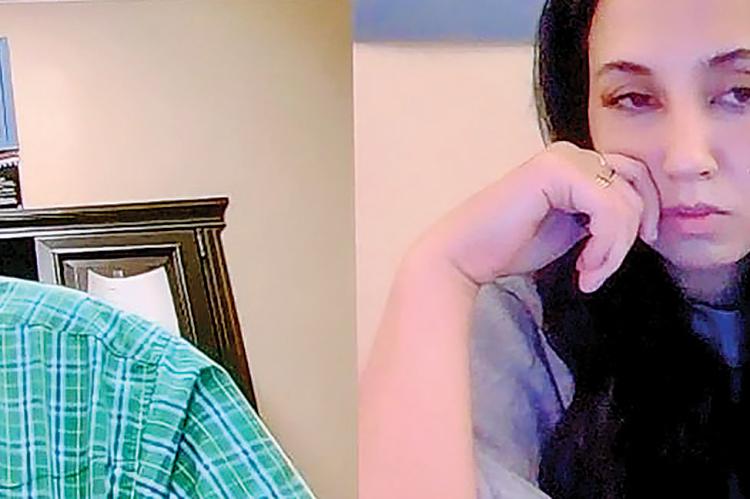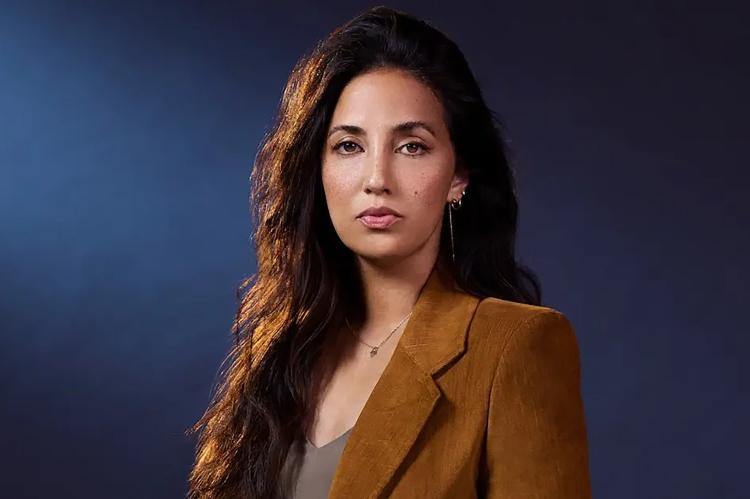Helping the law
Child advocate uses talents to bridge gap between law enforcement agencies and catching online predators
Note: This is the second article in an effort to look behind the scenes of how Canadian County law enforcement and other entities work to find and stop online predators of children.
There’s an old saying “It takes a village to raise a child.”
In reality, however, not every adult in those villages has the best interest of children at heart. In fact, it’s just the opposite – a dark sadistic opposite.
According to the Child Crime Prevention and Safety Center, there is an estimated 500,000 predators seeking a sexual relationship with minors every 39 seconds over multiple Internet platforms.
Online predators go to great lengths to keep their identities a secret and stay one step ahead of the local, state and national law enforcement agencies tasked with bringing them to justice.
That’s where child advocates like Roo Powell step in to help.
Powell is the founder of the nonprofit organization Safe From Online Abuse or SOSA. The group's mission is to “provide information and care in every step of the online sex abuse process, from preventing harm to intervening in active abuse to providing critical support to those who have experienced it.”
“I have been a career-long writer on issues such as child abuse and human trafficking. I was working for a tech company and seeing all these instances of sex abuse.
“What the concerning thing was that this is all new in theory. We didn’t grow up with smart phones. Our parents were worried about people that were within driving distance or people you came across at the neighborhood 7-Eleven.”
That world, says Powell, changed as technology evolved.
“With the Internet, adults have access from all over and the kids can be in their bedrooms talking to a perpetrator that is five states away and that’s what people don’t get,” said Powell.
Born in Hong Kong, Powell’s father was an Australian publisher and journalist. Following in her dad’s footsteps, she would use her writing skills to demonstrate just how easy predators can reach out to a child.
“I figured out a way to demonstrate this by putting a fake kid online to show how quickly a perpetrator can reach out. I ended up writing a story about it,” said Powell.
Making a difference
The number of online interactions between predators and underage children is staggering.
According to the National Center of Missing and Exploited Children, there were 19,174 reported cases of online enticement in 2019. Those reported cases jumped 97.5 percent to 37,872 in 2021.
Powell stepped away from that technology job in 2019 and a year later formed SOSA.
“I ended up leaving the tech company and starting SOSA because I felt like I had the skill set to locate these perpetrators of sex abuse and exploitation,” said Powell.
She put those skills to the test in the real world through the same medium predators use – electronic media. With the help of executive producer Ron Simon, Powell became the main voice and the face of the Discovery Network show “Undercover, Underage.”
The first six-episode season aired in 2021 and showed Powell’s group interacting with predators online and eventually catching them through law enforcement agencies.
“We take a very passive role online and make them (predators) do the approaching. We go very conservative when dealing with law enforcement agencies because the rules differ state to state,” said Powell.
Working with Canadian County
One of those law enforcement agencies is the Canadian Country Sheriff’s Office and its Internet Crimes Against Children unit – better known as ICAC.
The two groups worked together to put a repeat offender, out on bail, back behind bars.
“We think that Roo does a very good job with her approach and how she handles everything very professionally and carefully as not to create any legal issues for prosecution,” said Canadian County Sheriff Chris West.
West said Powell’s dedication to stopping online exploitation of children is obvious.
“I believe that she is very genuine and sincere, and I absolutely feel the same way about protecting children.
“It’s my top priority,” said West.
The results from work with the CCSO is not always the normal.
Powell said her experiences with law enforcement agencies has varied, often affected by what she calls “vigilante groups” which take more aggressive and physical approaches to bringing suspected predators to justice.
“They (law enforcement) are reluctant because of the amount of vigilante groups that are out there and will try and show up and shame people. I get that desire but they are oftentimes tying up law enforcement agencies and that hurts us when we are trying to work with them at the same time.
“We want to work with agencies to the extent that we are a help rather than a hindrance,” said Powell.
SOSA and Powell’s approach versus that of vigilante groups indeed helps law enforcement agencies.
“The problem with vigilantes is the situation they can create is not only dangerous but the case may be unprosecutable. A lot of video is posted online from these groups and people get mad at law enforcement for not doing anything. The answer is we most likely can’t.
“Either a crime has not been committed or evidence was taken in a way that makes the case not prosecutable.
“It is important that evidence is gathered correctly. SOSA does not conduct decoy stings without working with law enforcement. They are careful in their approach and always seek to ensure the investigation is done correctly,” said Major Adam Flowers, who heads up Canadian County’s ICAC unit.
An example of Powell’s attention to detail is shown by how she refers to targets of any SOSA investigations.
“I never call them a pedophile because that is a medical diagnosis and I’m not a doctor. But these people need help and I hope the show makes people realize that and that they do get help.
“I hope the show is able to do that for some people,” said Powell.
Through their partnership with SOSA, Canadian County has made more than three dozen arrests with several predators coming from outside of Oklahoma. That number, said Powell, shows the problem with online sexual exploitation is nationwide.
“We have been online with people in all 50 states. We have not done operations in all 50 states, but like the operation in Oklahoma, we had people coming from Kansas. We have them coming from everywhere,” said Powell.
Powell, who was an online decoy herself during season one of Undercover Underage, said her work has come with threats of personal harm.
“You get people that are angry about what you are doing and you get threats but some things are worth the risk.
“Every kid deserves to have an adult in their corner. They deserve to have a protector and a safe place to land and if we can do that, then I have done my job,” said Powell.
According to the Department of Justice’s website, the national ICAC program is made up of 61 different regional task forces that encompass 5,230 federal, state and local law enforcement and prosecutorial agencies throughout all 50 states. Those agencies have reviewed 7 million reports of online child exploitation, resulting in the arrests of more than 134,000 people.
Powell said SOSA’s focus is not solely based on making arrests of predators.
“Forget about the number of arrests. It’s more about the number of young people that reach out and say that they can now realize this was not their fault and that they feel validated.
“The idea that we are helping young people find that validation and healing is so important,” said Powell.








